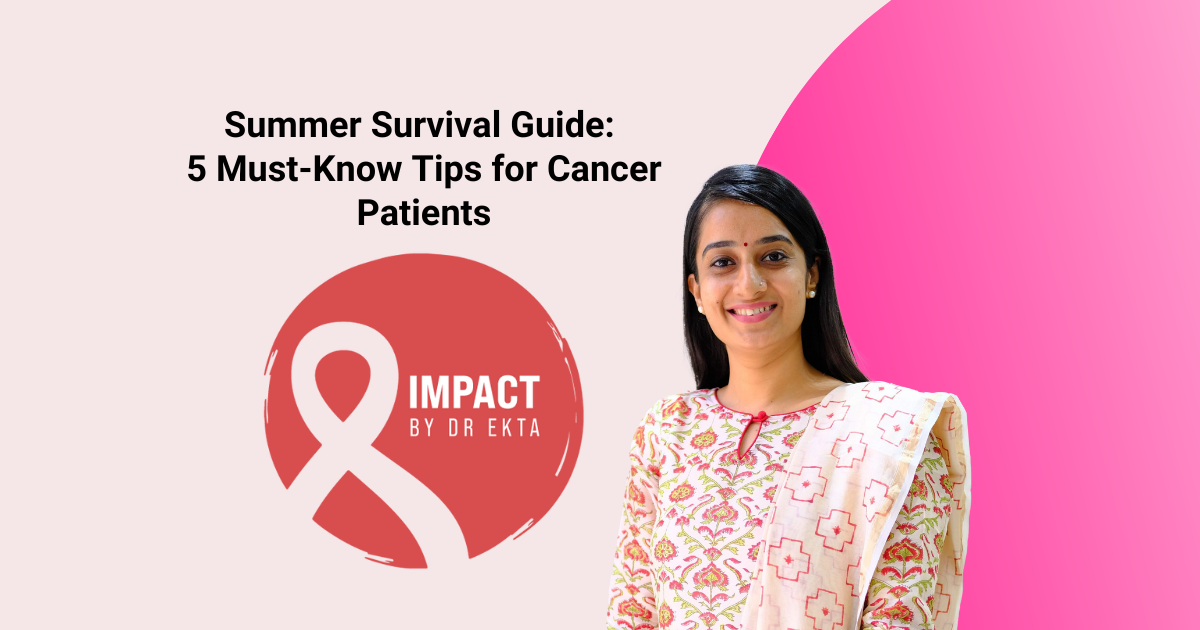Cancer treatment can be physically and emotionally challenging at any time of the year, but summer brings its own unique set of difficulties. High temperatures, increased sun exposure, and dehydration risks can complicate recovery or ongoing care. This Summer Survival Guide is tailored for cancer patients and survivors to help them stay safe, comfortable, and healthy during the hotter months. These practical tips are based on medical advice and authoritative health guidelines, designed to empower you with clear actions for your well-being.
1. Stay Hydrated and Nourished
Summer heat increases the risk of dehydration, which can be particularly dangerous for those undergoing chemotherapy or radiation therapy.
Tips to stay hydrated:
- Drink at least 8-10 glasses of water daily, unless advised otherwise by your doctor
- Include electrolyte-rich drinks like coconut water or ORS if experiencing vomiting or diarrhea
- Avoid sugary sodas, alcohol, and caffeine as they can contribute to fluid loss
Nutrition pointers:
- Opt for hydrating fruits like watermelon, cucumbers, and oranges
- Eat small, light meals more frequently instead of heavy portions
- Avoid overly spicy or oily foods that can trigger nausea
Learn more about nutrition for cancer patients
2. Protect Your Skin from the Sun
Many cancer treatments, including chemotherapy and targeted therapies, can increase skin sensitivity to UV rays, raising the risk of sunburn and skin damage.
Sun safety tips:
- Wear protective clothing like long-sleeved shirts, wide-brimmed hats, and sunglasses
- Apply a broad-spectrum sunscreen with SPF 30 or higher, even on cloudy days
- Avoid going out between 10 a.m. and 4 p.m., when the sun is at its strongest
- Sit in the shade or use an umbrella when outdoors
Important Note: Radiation-treated skin should be handled with extreme care, consult your oncologist for specific instructions.
3. Manage Fatigue in Hot Weather
Fatigue is one of the most common side effects of cancer treatment. The summer heat can intensify tiredness and reduce physical stamina.
Energy conservation strategies:
- Schedule activities during cooler parts of the day, such as early morning or evening
- Take frequent breaks and rest in air-conditioned or well-ventilated spaces
- Engage in light exercise like stretching or slow walks to maintain circulation without overexertion
- Prioritize tasks and avoid unnecessary physical effort during high-temperature days
4. Practice Safe Outdoor Activity
Being outdoors can help boost mood and vitamin D levels, but it should be done carefully. Immunocompromised cancer patients must take extra steps to avoid infection, heat stress, and physical strain.
Outdoor activity checklist:
- Walk in shaded parks or gardens early in the morning
- Wear well-ventilated footwear and inspect for blisters or swelling
- Use insect repellent to prevent bites, which can lead to infections
- Avoid crowded or dusty areas to reduce exposure to pathogens
Check our blog on mental health tips for cancer patients
5. Keep an Emergency Summer Kit
Preparation is key to managing unexpected symptoms or complications while on the go during summer.
Must-have items in your kit:
- Oral rehydration salts or electrolyte sachets
- Prescription medication and copies of prescriptions
- Cooling towels or a handheld fan
- Sunscreen and moisturizer for sensitive skin
- Healthy snacks like protein bars or fruit slices
Common Concerns and FAQs
Can I travel during summer if I’m undergoing treatment?
- It depends on your treatment stage and health status. Always consult your oncologist before making travel plans.
Is swimming safe during chemotherapy?
- Avoid public pools if your immunity is low. Chlorinated water may also irritate sensitive skin.
Should I wear a mask outdoors in summer?
- If you’re immunocompromised or in crowded areas, wearing a lightweight mask is advised.
Can sun exposure worsen treatment side effects?
- Yes, especially with radiation or chemotherapy. Always follow your doctor’s advice on sun exposure.
Trusted Resources and Further Reading
Final Thoughts
This Summer Survival Guide is meant to be a practical and empowering tool for cancer patients and caregivers. Simple precautions like staying hydrated, protecting your skin, and planning your day can make a big difference in how you feel and heal during summer. Talk to your oncology team about your summer plans and follow a care plan tailored to your needs. Staying informed is the first step to staying safe.

